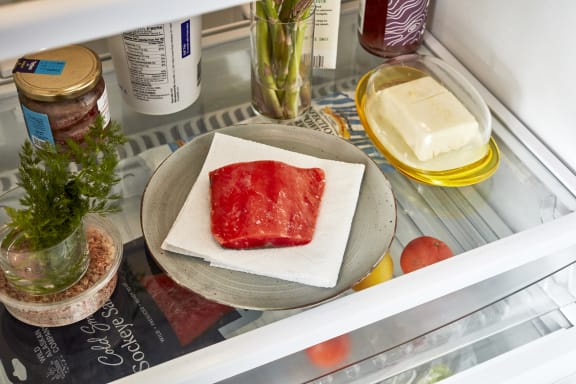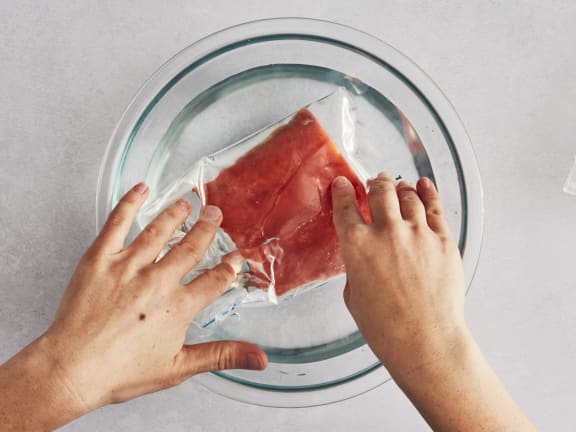Knowing how to thaw salmon properly ensures that you’ll be able to enjoy all of the quality and flavor that it has to offer. It’s important to thaw frozen salmon the right way because when done improperly, you run the risk of damaging the quality of the fillets. In some cases, improper thawing technique can lead to food safety issues.
Luckily, defrosting salmon properly is easy. We’ve got you covered here with two different step-by-step methods:
-
The Best Way (10 to 12 hours)
-
The Quick Way (less than an hour)
If you’re really short on time, consider cooking salmon from frozen. Although we recommend taking the time to thaw your salmon properly for optimum flavor and texture, knowing how to cook from frozen can open up your meal options throughout the week when you don’t have time to plan ahead.
The Best Way to Thaw Salmon
How long does it take to defrost salmon in the refrigerator? 10-12 hours, or until defrosted through.
Defrosting salmon overnight in the refrigerator is the best way to preserve its integrity. This is also the safest way to thaw frozen salmon, since it gradually defrosts in controlled, cool temperatures that inhibit the growth of harmful bacteria.
Step 1
Remove salmon from its vacuum-sealed packaging.

Step 2
Place your seafood on a plate/tray lined with paper towels or a tea towel that will fit on a low shelf in your refrigerator, arranging them in a single layer if possible. The paper towels will absorb the liquid melting off the salmon.

Step 3
Place this on a low shelf in the refrigerator (typically the coldest spot in the refrigerator).

Step 4
Once the salmon is thawed, pat it dry before cooking to remove any excess moisture for best flavor and texture. We recommend cooking your seafood within a day or two of being defrosted.

How to Defrost Salmon Quickly
How long does it take to defrost salmon fast, on the countertop? Less than 1 hour.
For those days when you don’t have enough time to thaw salmon the standard way, you can use a safe and quick thaw technique that will have you cooking in under an hour — even as little as half an hour, depending on the thickness of the fillet. This is the fastest way to defrost salmon while maintaining its quality, and also a safe method that aligns with recommendations from the USDA.
SAFETY NOTE: When you defrost salmon quickly on the countertop in a bowl of cold water, you must cook it promptly after thawing. This is because it is going to be exposed to temperatures that are above 40F. When raw protein is exposed to temperatures between 40F and 140F — also known as the "danger zone" — it is much more susceptile to the rapid formation of bacteria that can expose you to foodborne illness. The USDA recommends never leaving raw proteins out of refrigeration for more than 2 hours (or 1 hour, if your ambient room temperature is 90F or higher). By cooking the salmon promptly after it has been defrosted quickly on the countertop, you're able to limit the amount of time that is spends in the danger zone.
Step 1
Remove the salmon from its vacuum-sealed packaging. Then, place it in a separate, resealable bag that can be sealed tightly.

Step 2
Next, fill a bowl with cool water. The bowl should be large enough to hold all of the seafood you’ll be defrosting, and the water should be cool to the touch. Do not use warm water for food safety reasons.

Step 3
Put the resealable bag of salmon into the bowl of cool water, keeping it submerged with another object. At the 20- or 30-minute mark, change out the water in the bowl, refilling with cool water, making sure that everything is still submerged.

Step 4
Once the salmon has thawed, pat it dry to remove excess moisture. Salmon defrosted on the countertop must be cooked promptly after thawing.

Defrosting Salmon FAQs
How long does it take to defrost salmon in the refrigerator?
10 to 12 hours, or overnight. Times will vary depending on the temperature of your refrigerator.
How long does it take to defrost salmon quickly on the countertop?
Less than 1 hour. Thinner portions and fillets may only need 30 minutes to defrost, while thicker portions and fillets may need up to 1 hour.
Can you thaw salmon in its packaging?
If your salmon comes in a vacuum-sealed pack, you must remove it before thawing regardless of whether it is defrosted in the refrigerator or the countertop. Defrosting salmon or any variety of seafood in a low-oxygen environment potentially introduces dangerous toxins into the seafood that cannot be killed through cooking.
Be sure to stock your kitchen with sustainably-caught seafood from Wild Alaskan Company. You’ll get high-quality, wild-caught seafood delivered straight to your doorstep. Choose your salmon subscription box today.





